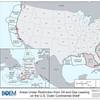Major Shipping Nation Sccedes to key Conventions
His Excellency Mr. Basil G. O'Brien, High Commissioner and Permanent Representative of the Commonwealth of the Bahamas to IMO has deposited with IMO Secretary-General, Efthimios E. Mitropoulos, instruments of accession to the International Convention on the Control of Harmful Anti-fouling Systems on Ships, 2001 (AFS Convention) and the International Convention on Civil Liability for Bunker Oil Pollution Damage, 2001 (Bunkers Convention).
The AFS Convention will prohibit the use of harmful organotins in anti-fouling paints used on ships and will establish a mechanism to prevent the potential future use of other harmful substances in anti-fouling systems. Parties to the Convention are required to prohibit and/or restrict the use of harmful anti-fouling systems on ships flying their flag, as well as ships not entitled to fly their flag but which operate under their authority, and all ships that enter a port, shipyard or offshore terminal of a Party.
The AFS Convention will enter into force, generally and for the Bahamas, on 17 September 2008. Accession by the Bahamas brings the number of States having ratified the Convention to 28 and the tonnage figure to 43.79 per cent of the world's fleet.
The 2001 Bunkers Convention was adopted to ensure that adequate, prompt, and effective compensation is available to persons who suffer damage caused by spills of oil, when carried as fuel in ships' bunkers, and will enter into force, both generally and for the Bahamas, on 21 November 2008.
During his meeting with Mr. Mitropoulos, High Commissioner O'Brien also deposited the contribution of the Bahamas to the budget of IMO for 2008, with a cheque for £1,227,968. Contributions to IMO's funding are assessed according to the size of a country's registered merchant shipping tonnage. The Bahamas has the world's third-largest registered fleet.















